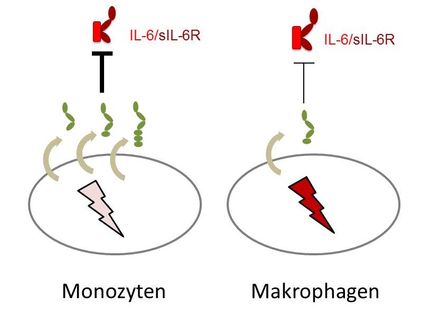Simply resolving inflammation through the flick of a switch
Frankincense resin as an anti-inflammatory - without side effects?
A research team at the University of Jena has discovered a molecular mechanism that can resolve inflammation and promote tissue regeneration – possibly without side effects. A natural substance from frankincense resin flicks the molecular “switch”.

Frankincense resin in petri dishes. A natural substance from the resin can dissolve inflammation and promote tissue regeneration.
Jan-Peter Kasper/Uni Jena
Chronic inflammatory processes are the most common causes of a variety of widespread diseases. They play a role in arthritis, asthma, Parkinson’s disease and Alzheimer’s disease, but also in arteriosclerosis, diabetes and cancer. Drugs that inhibit inflammation are, therefore, among the medicines that are taken most frequently worldwide. However, they often have only low therapeutic efficacy, while the side effects are severe, including kidney dysfunction or stomach ulcers.
“For this reason, current research is striving to develop alternative therapeutic strategies,” says Prof. Oliver Werz of Friedrich Schiller University Jena. The approach used by the professor of pharmaceutical chemistry and his team is not simply to block inflammation, but to actively support its resolution. In a new study, published in the journal “Advanced Science”, the researchers present a promising new therapeutic approach to solving the problem.
To this end, they specifically stimulate the production of inflammation-resolving messenger substances called resolvins. “We already knew from earlier work that constituent substances of frankincense resin are suitable for this purpose,” says Oliver Werz. In particular, the boswellic acid from frankincense is able to reprogramme a central inflammatory enzyme, 5-lipoxygenase, such that it produces anti-inflammatory resolvins instead of pro-inflammatory substances.
Boswellic acid stimulates the production of anti-inflammatory messenger substances
“We tested and confirmed this previously known phenomenon in immune cells relevant to inflammation, and completely surprising effects emerged,” adds Werz. Thus, boswellic acid also acts as a “cell activator” via another enzyme, 15-lipoxygenase-1, and triggers the formation of large quantities of resolvins. Thanks to detailed investigations in collaboration with researchers at Lousiana State University (USA), the team was also able to clarify the underlying mechanism: the boswellic acid docks into a very specific site on the 15-lipoxygenase-1 and thus directly activates the formation of resolvins in the cell. “In this way, resolvin production in immune cells can be specifically switched on by an active substance,” explains Werz.
Further experiments with mice have already confirmed this mechanism in the living organism. The researchers now hope that, in analogy to boswellic acid, additional active substances can be developed that stimulate the production of resolvins in immune cells through targeted activation of 15-lipoxygenase-1. This could open up new therapeutic options that would actively resolve inflammation and promote tissue regeneration, without the side effects of current inflammation blockers.
Original publication
Other news from the department science

Get the life science industry in your inbox
By submitting this form you agree that LUMITOS AG will send you the newsletter(s) selected above by email. Your data will not be passed on to third parties. Your data will be stored and processed in accordance with our data protection regulations. LUMITOS may contact you by email for the purpose of advertising or market and opinion surveys. You can revoke your consent at any time without giving reasons to LUMITOS AG, Ernst-Augustin-Str. 2, 12489 Berlin, Germany or by e-mail at revoke@lumitos.com with effect for the future. In addition, each email contains a link to unsubscribe from the corresponding newsletter.
More news from our other portals
Last viewed contents
Hermann_Emil_Fischer
Timeline_of_evolution
Study Identifies Molecular Complex Vital to Creation of miRNAs - Possible Links to DiGeorge Syndrome, Schizophrenia Also Seen
Humanzee
Mast_cell
Jonathan_Dordick
Carpometacarpal_joint
Adrianne_Pope
Watching the inflammation process in real time
Jimmy_Reed





















































